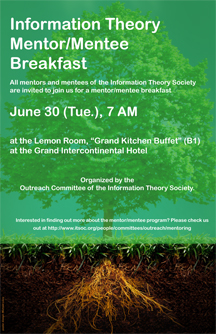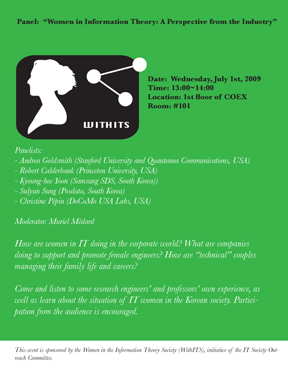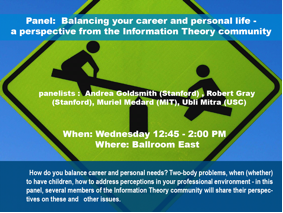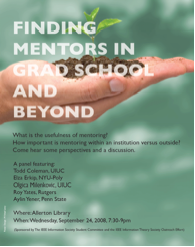Members |Events |Links
Information Theory
Mentor/Mentee
Breakfast
All mentors and mentees of the Information Theory Society
are invited to join us for a mentor/mentee breakfast
June 30 (Tue.), 7 AM
at the Lemon Room, “Grand Kitchen Buffet” (B1)
at the Grand Intercontinental Hotel

click to see larger image
Panel: “Women in Information Theory: A Perspective from the Industry”
Date: Wednesday, July 1st, 2009
Time: 13:00~14:00
Location: 1st floor of COEX
Room: #101

Update on the Society’s Outreach Efforts.
This year the Board of Governors decided at our first meeting of the year in Porto to back an initiative to increase our outreach to encourage diversification of our membership, particularly for women members, in a way that is inclusive and beneficial for all our members, to be led by me, with the advice and assistance of Bob Gray. In doing so, we are following the lead of successful programs in related fields. Many of our members may already be familiar with the very well attended ICASSP women’s breakfast or with the networking community’s N^2 Women (networking networking women) initiative (http://www.comsoc.org/N2Women/). The N^2 Women have helpfully documented what seem to be the main components of a successful initiative: events at main conferences, co-opting both senior and junior members of the community, a mailing list with very few but useful e-mails, and a visible web site hosted by the relevant society.
The level of participation of women in the Society provides a mixed picture. The participation of women in our society at different member levels is given in the table below. For the purpose of comparison, two or our sister societies, Signal Processing (SP) and Communications (COM) are also shown. The grades of membership are shown as follows GSM – graduate student member, Mem – member, SM – senior member, Fel – Fellow, LF – Life Fellow.

The numbers bear out the pattern, often observed in science and engineering, of a shrinking pipeline. Overall, our numbers are comparable to those of our sister societies. The male/female multiplier at the different levels are, over all Fellows (Fel+LF), 34 for IT, 20 for SP, 44 for COM; for GSM they are around 7 for all three societies and for members they are all between 16 and 17. The only worrisome disparity with respect to other societies seems to occur at the senior member level, which is the pipeline for Fellows. The ratios at that level of membership are 19 for IT, 13 for SP and 16 for COM. While the number of Fellows in the last years has risen considerably (an inspection of the list of Fellows shows at least 7 in the last 8 years), it would appear the majority of those (possibly all – IEEE did not have the data available) rose to the level of Fellow through Societies other than IT. The historical data on participation of our women members in ISIT TPCs has been very variable. While no numbers are easily available, an inspection of the list of TPC members (which may suffer from some inaccuracy in my visual inspection, for which I apologize) shows that the numbers were 3/58 for 2005, 1/55 for 2006, 6/56 (and 2/4 TPC co-chairs) for 2007 and 3/63 for 2008. The trend of participation in the future may be increasing. Participation of women in leadership of the Society seems to be encouraging. The participation of women in the Board of Governors seems relatively robust recently, with about 3/20, including our President elect.
The topics of our meetings have been selected in keeping with our mission to provide events that address needs and encourage participation of our underrepresented demographics, while being of interest and use to the community at large. The topic of balancing work and life is often important in career decisions of women and, increasingly, in those of men as well. Our first event took place at ISIT in Toronto, on the topic of balancing career and personal life, with planned panelists of Andrea Goldsmith, Bob Gray, Ubli Mitra and myself. Fittingly, given the topic of the panel, I had to rush home because of a very sick child, but Lalitha Sankar and Elza Erkip kindly agreed to participate on the panel. The attendance and enthusiasm of the event was very encouraging. The attendance was of 150-200, and the benefit of the event to the entire community was evidenced by the fact that men constituted about half or a little more of the audience.
The issue of finding mentoring is of particular importance for demographic groups with low representation. Our second event, spearheaded, by Todd Coleman, took place at Allerton, on the topic of finding mentors in grad school and beyond, was done in collaboration with the student initiative, led by Aylin Yener. The roughly 40 participants included junior and senior faculty as well as graduate students and postdocs. The panelists (Todd Coleman, Elza Erkip, Olgica Milenkovic, Roy Yates, Rutgers and Aylin Yener) and the participants discussed topics around how to find mentors within and outside one’s institution, both during graduate school and one’s professional career, and how to be a more effective mentor. Our sincere thanks go to the organizers of ISIT and Allerton 2008 for their help and support in making these events a success.
In order to help foster an online community, we have created a new mailing list withits@mit.edu (Women in the Information Theory Society), which has been collecting new names and which is open to all. This list will be used, with great restraint, mainly to advertise future events. We are also collecting web pages from interested members of our Society to create a WithITS webpage, which we shall link to our Society web site. If you wish to be added to this mailing list or to have your web page added to the WithITS, please e-mail me at medard@mit.edu (please send the url of your webpage if you wish for it to be included). Feel free to contact me with suggestions for future events, in particular if you would be interested in helping to lead such an event.


